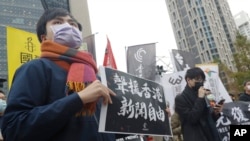Criticism of Hong Kong’s judicial independence has no “value” according to the special administrative region’s chief justice, but law experts say many questions remain.
Since Beijing imposed a national security law on the region 18 months ago, Hong Kong has endured major changes to its political system and media environment.
Now, attention has turned to whether Hong Kong’s judiciary can remain freestanding as Beijing tightens its grip.
In December, Britain released a six-month report about Hong Kong that outlined the city’s eroding freedoms after the implementation of the security law. The report included the accusation that Hong Kong’s “judicial independence is increasingly finely balanced.” The Hong Kong government rejected the finding.
Concerns remain, though, as to whether Hong Kong will maintain its British-style justice system or eventually replace it with China’s opaque system.
Speaking at the opening of the legal year Monday, Hong Kong's Chief Justice Andrew Cheung said the territory's judicial independence is “fact,” RTHK reported.
“Criticisms of court decisions, which are made without first ascertaining the facts in a case or reading and understanding the reasons for the court's decision, are as meaningless as they are hollow – so is any unsubstantiated doubt over the court's independence. Judicial independence in Hong Kong exists as a fact. And we are here today to bear witness to this fact.”
But one lawyer formerly of Hong Kong, who chose to remain anonymous, told VOA that Cheung hasn’t taken into account criticism of the judiciary.
“The Chief Justice’s comments at the opening of the legal year are thoroughly underwhelming. (The) dismissal of critics of Hong Kong's rule of law as being motivated by ‘surmises, political stances or geopolitical considerations’ also smacks of CCP (Chinese Communist Party) propaganda. I would expect a Hong Kong judge to stick to analytical reasoning, and weigh these criticisms for their merits, rather than attack the critics for ulterior motives,” the lawyer said.
The national security law prohibits acts deemed as secession, subversion, foreign collusion and terrorism, with punishments of up to life in prison. Critics of the security law – including pro-democracy opposition and Western governments – have said the legislation threatens Hong Kong’s unique autonomy, promised when Britain handed the territory back to China in 1997.
Out of at least 150 people who have been arrested under the security law, five have been convicted and three have been sentenced to jail.
Those sentenced include former waiter Leon Tong Ying-kit, 24, who received nine years in prison following his conviction for terrorism and secession in July. November saw pro-democracy protester Ma Chun-man sentenced to nearly six years in prison for inciting secession, and pro-independence youth activist Tony Chung sentenced for secession and money laundering.
For Hong Kong's national security law cases, Chief Executive Carrie Lam has handpicked judges to oversee the proceedings, a move that has angered legal experts.
"What about the existence of the appointment system in the first place? Why should there be national security law judges? How does that serve the rule of law or ensure a fair trial?" asked the lawyer who was formerly in Hong Kong.
Eric Yan-ho Lai, a law analyst and fellow at Georgetown University, also questioned the way judges are selected to preside over national security cases and whether there are any checks on the chief executive’s power to choose them.
Cheung said Monday the impartiality of the courts was not affected because all designated judges are bound under judicial oath to pass justice without fear or favor, self-interest or deceit.
But Yan-ho Lai told VOA, “Andrew Cheung could not explain why the chief executive picking the national security law judges would not affect impartiality, especially when Cheung himself visited the chief executive for a meeting just before the Court of Final Appeal hearing on Jimmy Lai's bail appeal.”
Media mogul Jimmy Lai is in jail facing a slew of criminal charges and facing the possibility of life in prison. Reports said Lam met with Cheung ahead of a bail hearing for Lai in February. Lam denied discussing court cases with Cheung, reiterating her commitment to judicial independence, the South China Morning Post reported.
Since the security law has been in force, Hong Kong authorities have arrested pro-democracy activists, journalists and former lawmakers with the crackdown paving the way for a political revamp in the city.
Last month, Hong Kong’s mini parliament, the Legislative Council, saw its first-ever “patriots only” elections in which all but one of the seats were won by pro-Beijing candidates.
Beijing restructured the legislature last year by reducing the number of directly elected seats voted on by the public. A vetting committee comprising Beijing loyalists also has been installed to determine whether political candidates are loyal to China. No member of the pro-democracy opposition ran in the elections.
Those arrested under the security law include dozens of pro-democracy political figures who remain in pre-trial detention after being charged under the law in February.
“Although Andrew Cheung shared his beliefs, he could not explain why fair trial can be upheld when dozens of national security law defendants are being remanded in pre-trial detention for almost a year. When Cheung's words and deeds are not consistent, the public might be less convinced that the integrity of the court in Hong Kong can be upheld in the post-national security law era,” Yan-ho Lai added.
Additionally, Hong Kong’s media have taken a downward turn since pro-democracy newspaper Apple Daily closed in June when several of its executives were charged under the security law and authorities froze the company’s financial assets.
And pro-democracy news outlet Stand News closed its doors on Dec. 29 as part of a sedition investigation. Independent news sites Citizen News and Mad Dog Daily also decided to fold, citing uncertainty in the region.
At least 50 civil society groups also have disbanded in Hong Kong since last year.




